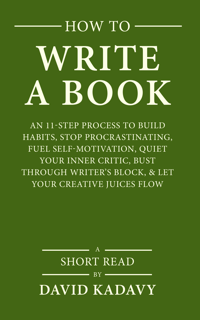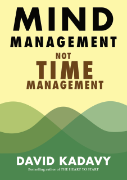Subscribe to blog updates via email »
Mind Management (Not Time Management)
This blog post is now a book! Buy it here.
An audio version of this post is available here.
Productivity is less about time management than it is about mind management. We all have the same number of hours during the day. How effectively we spend those hours really depends upon how well we can manage and harness our fragile mental energy.

WANT TO WRITE A BOOK?
Download your FREE copy of How to Write a Book »
(for a limited time)
Productivity is less about time management than it is about mind management.
— ? David Kadavy (@kadavy) May 1, 2012
For example, when I was writing my book, I admittedly had a difficult time managing my mental energy. The project seemed to consist of 12 hours a day banging my head against the wall, only to get maybe 15 or 20 minutes of real “flow” – writing that really took a smooth path from my brain to my fingertips.
Imagine if I could have sat down for 15 or 20 minutes a day, did my writing, and then enjoyed the rest of my day. This seems unrealistic, but certainly I could have employed a strategy that could have made the process less agonizing.
Three Important Questions of Mind Management
Throughout the process of writing Design for Hackers, I did start to gain an intuitive sense of what was going on with my brain, and how to navigate my own mental landscape. I found myself consistently asking myself a few important questions:
- What kind of work do I need to do right now? Is there anything extremely pressing, or can I let my mental state guide the work that I decide to do right now?
- What kind of mental state am I in right now? Am I in the mood for draft writing, outlining, researching, exploring, or polishing? (Throughout the process, I began to codify the different types of work required to produce my writing.)
- Is there something I can do to get myself into the right mental state? Over time, I realized there were different “hacks” or rituals that would help me switch mental states. Exercising, massages, different types of music, different types of teas, epsom salt baths, and neurotransmitter-supporting amino acids all eventually served their own purposes. I also had different venues to do different types of work: for example, a cafe in a skyscraper high above the city was better for higher-level brainstorming, while a dark, small room in the public library was better for polishing or research. (Which is consistent with academic findings.)
The goal of mind management is to align your mental state with work that needs to be done, while also allowing your mind to do the work that it wants to do.
Key Takeaways of Mind Management
I didn’t have much time to think about what was going on during the book writing process, but once the smoked cleared, I began to get more fascinated by what, exactly, my brain was doing throughout all of this.
I picked up a few armchair neuroscience books, the most powerful of which, by far, was David Rock’s Your Brain At Work. This book basically explains the brainwaves, neurotransmitters, the different regions of the brain, and how they all work together throughout your day. I highly recommend it.
By really understanding how your brain works, you can have a framework with which to understand what is going on with your mind, and thus, you’ll be better equipped to know how to better use your precious mental energy.
Here are a few takeaways and tactics that I’ve developed from my research and experimentation:
- Your brain is plastic: Every time your neurons fire, it makes it easier for those same pathways to fire again. It used to believed that the brain was a static organ once you reached adulthood, but now we know that the brain changes throughout life. This means that each time you perform a thought or action, you make it easier for your brain to reproduce that thought or action. This has some pretty clear implications for positive vs. negative thoughts, and explains why meditation is so powerful (which I’ll get to in a bit).
- Love your prefrontal cortex: Your prefrontal cortex is the “newest” (in terms of evolution) part of your brain. Your prefrontal cortex is in charge of things like prioritization, planning, and suppressing urges. But, your prefrontal cortex is small, but energy-hungry. So when it gets tired, it’s hard for you to think about the overarching purpose of what it is you’re doing right now, or to keep yourself from checking Facebook and Twitter every 2 minutes. So, it’s important to get mental rest to keep your prefrontal cortex working well, and to set aside special time dedicated only to prioritization (such as Prefrontal Mondays).
- Fight your amygdala: Your amygdala is
the oldestone of the older (in terms of evolution) parts of your brain. A lizard’s brain is basically all amygdala (this is why Seth Godin talks about the lizard brain). Your amygdala is extremely fear-driven, and is programmed to save you from danger. The really tough part is that your amygdala communicates with your body even before the rest of your brain (which can handle much more complex thinking). For example, if you see a snake, your amygdala tells your sympathetic nervous system to increase your heart rate before your eyes can even tell your brain “this is a snake.” The rest of your brain will then conclude “my heart rate increased, so I’m scared of this snake.” Your amygdala always wants you take the “safe” route, and will stifle your creativity, so you have to be wary of its power. - Restorative things are productive: Given this struggle between your prefrontal cortex and amygdala, and the fact that your prefrontal cortex is so easily fatigued, it should be no surprise that rest is important to using your mind effectively. If you think you’re getting more work done by working until you collapse every night, I’d argue that you probably aren’t. You’re probably depleting your prefrontal cortex, and instead of thinking strategically, are filling up the time with reactionary, fear-driven (amygdala-driven) “work.” Restorative activities, such as exercising, sleeping, and spending time with loved ones help your brain reorganize. If you’re skeptical, there’s research showing that positive mood and sleep encourage insightful thinking, and that close relationships strongly affect happiness.
Mind Management in Action
With the above in mind, here’s a few actionable tips you can use to manage your mind effectively.
- Meditate: By practicing mindfulness meditation, you carve neural pathways to better process stimuli in your present environment, making you more calm and deliberate. To really get into it, I started with two sessions a day at 10–15 minutes for about 6 months. Now, I do one session a day. If you really think you can’t meditate, start with a 2-minute version of the 10-minute hack. If you can’t meditate for 2 minutes, you have bigger problems than being “too busy.”
- Make time for planning: Making planning a separate, dedicated activity has two benefits: 1) You can do it when your mental energy for planning is high (I like Sunday evenings), so that you do better planning, and 2) It frees up your precious prefrontal cortex to do other activities – since the planning and prioritization has already been done. I like to do a “weekly review” (a term familiar to GTDers) in which I make a bullet point list of everything going on in the coming week. Even if something is in my calendar, the act of typing it out into this list helps program it into my brain, while also reminding me to think about any details I might not have thought about yet (for example, if my flight on Wednesday is at 2pm, what time should I head to the airport?) Also, you might want to try Prefrontal Mondays.
- Trick yourself into starting: Just starting a task can be tremendously difficult. Without a clear goal in mind, your brain won’t produce enough dopamine to motivate you to start. The 10-minute hack gives you a really simple goal (work on this one thing for 10 minutes without stopping). The side benefits of doing this successfully are that resisting the urge to heed distractions helps strengthen your prefrontal cortex, and that once you’re actually 10 minutes into working on your task, it’s easier to continue working on it.
This is just the tip of the mind management iceberg, and as more great research is done, we’ll have more to go on in discovering how to manage our minds. If you’re into this content, I hope to expand on some of these ideas, so what sticks out to you? How do you manage your mind?



